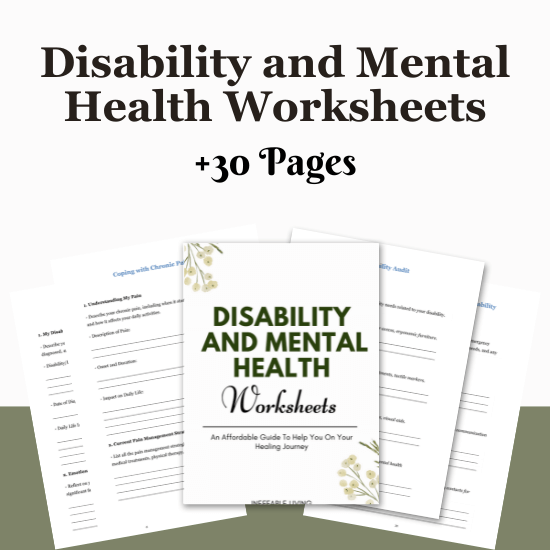Living with a disability in an ableist world is more than just navigating physical or medical challenges—it’s about surviving constant messages that you’re less than, inconvenient, or not quite enough. These daily microaggressions, assumptions, and exclusions don’t just wear on the body—they erode the nervous system, fuel anxiety, and fracture a sense of belonging. Here’s how ableism fuels anxiety—and why naming it is a vital step toward healing.
Ableism and Anxiety: The Mental Toll of Being “Othered”
1. Constant Hypervigilance Becomes Your Default
When you’re always anticipating stares, dismissive comments, or inaccessible spaces, your nervous system stays in fight-or-flight. You’re not “too sensitive”—you’re adapting to a world that often overlooks you.
2. You Internalize the Need to Prove Your Worth
Ableist messages tell you to “overcome,” “be inspirational,” or “push through”—as if your value is tied to performance. This creates chronic anxiety about being “good enough” just to exist.
3. You Experience Emotional Exhaustion From Educating Others
Explaining your needs. Correcting assumptions. Advocating for accommodations. The pressure to constantly teach while managing your own wellbeing takes a toll that others rarely see.
Related: Top 10 Practical CBT Exercises For Generalized Anxiety Disorder Relief
4. You’re Told to Be Grateful for Basic Inclusion
Being treated with decency or offered bare-minimum accessibility shouldn’t feel like a favor. Yet the expectation to say “thank you” for being included adds layers of emotional labor and guilt.
5. Your Needs Are Dismissed as “Too Much”
When you advocate for your mental or physical health, you may be met with eye-rolls, passive-aggression, or flat-out denial. Over time, this teaches your nervous system to suppress, mask, or apologize for your needs.
6. You Feel “Othered” in Places That Should Feel Safe
Whether it’s a classroom, office, family gathering, or medical setting, being the “exception” in a system built for someone else chips away at your sense of safety—and belonging.
7. The Anxiety Isn’t Just Internal—It’s Environmental
This isn’t about personal weakness. It’s about the chronic stress of navigating a world that often treats disability as a flaw rather than a form of human diversity.
Related: High Functioning Anxiety Test (& How To Support Anxiety Recovery)
How to Begin Healing From the Mental Toll?
1. Name the Ableism—Out Loud or On Paper
Say it:
“This isn’t just anxiety. This is what happens when I’m constantly made to feel like I don’t belong.”
Naming the source is a powerful act of clarity and validation.
2. Let Yourself Be Angry—Without Guilt
Anger is a signal that your boundaries, value, or humanity have been violated. You’re allowed to feel it.
3. Build a Space Where You Don’t Have to Explain Yourself
Whether online, in-person, or in writing—find people who get it. Shared language and mutual understanding help regulate anxiety and rebuild emotional safety.
4. Redefine Strength on Your Own Terms
You don’t have to “overcome” to be worthy. You don’t have to inspire anyone. Strength can look like rest, softness, boundary-setting, or choosing joy in a world that tries to dim it.
5. Work With Therapists Who Are Trauma- and Disability-Informed
You deserve care from professionals who see your full story—not just your symptoms. Therapists who understand the trauma of being “othered” can help you hold space for grief and resilience.
Related: How to Relieve Anxious Sensations In Your Body?

Conclusion
Ableism doesn’t just hurt—it rewires your sense of safety. The anxiety you carry isn’t “in your head.” It’s a response to a world that wasn’t built with you in mind. But you still belong here. And the more we name, challenge, and grieve the toll of being “othered,” the more room we make for healing—and collective liberation.


